Barriers to Employment: What Help Really Means for Disabled People
Gillian Carroll, a member of the CAPE Chronic Pain Advisory Group, shares her thoughts after attending the Healthy Lives Working Group PPIE Conference in Glasgow recently.
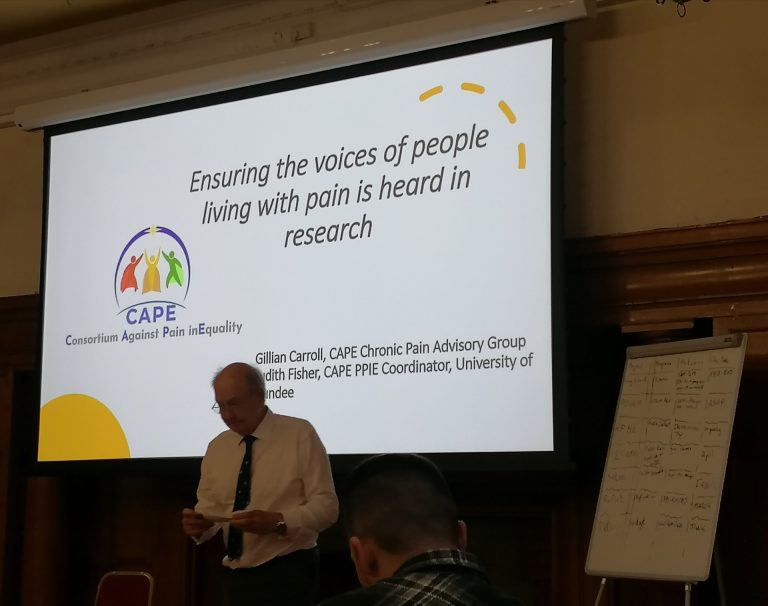

Ensuring the Voices of People Living with Pain are Heard
On Thursday the 20th of February, CAPE expert by experience, Gillian Carroll, and Public Patient Involvement and Engagement Coordinator, Judith Fisher, ran an NIHR funded workshop at the Healthy Working Lives Group: PPIE Conference: Bringing Voices Together for Workplace Health and Wellbeing at the University of Glasgow.
The workshop, entitled, ‘Ensuring the voices of people living with pain in heard in research’, blended personal experiences from people living with pain with group reflections to consider the barriers that exist for people living with pain in engaging with research and how these can be overcome.
The key themes emerging from the workshop were: the importance of basing involvement on relationships of trust; the need to consider individual needs and offer flexibility opportunities to contribute; and the importance of meaningful involvement with identified goals and ongoing feedback.
Judith Fisher, PPIE Coordinator said, “It was great to get the chance to talk about CAPE’s work and share some of the insights of our experts by experience.”
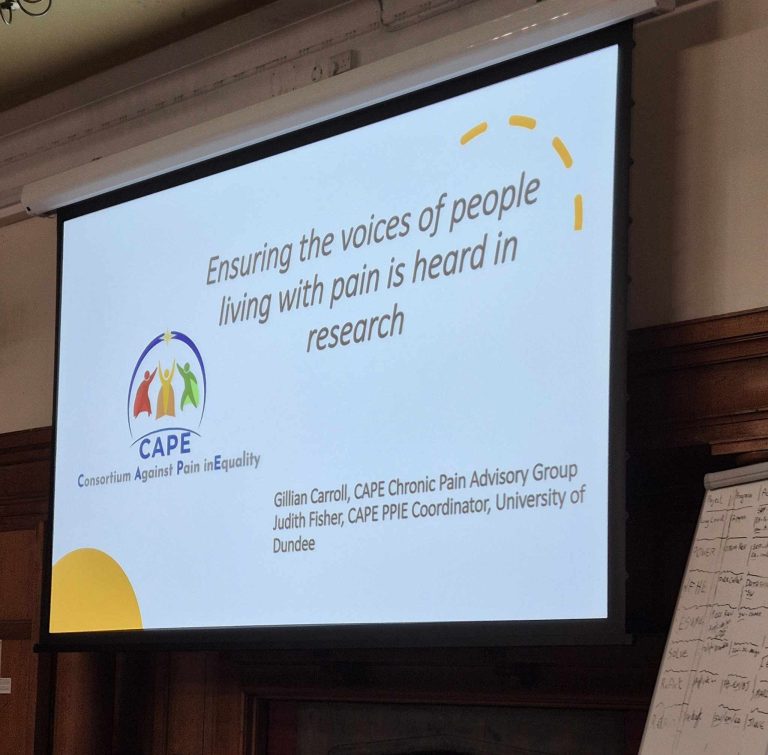
Pain Awareness Month and Bone and Joint Week
For Pain Awareness Month, Alleviate collected “My 3 Words”, where people living with chronic pain submitted 3 words that described their experiences. See the results here: My 3 Words
During Bone and Joint Week, Orthopaedic Research UK hosted a Webinar with 3 experts, including Prof Tim Hales of CAPE, discussing the importance of musculoskeletal health. Read more about it here: Bone and Joint Week Webinar
Adverse experiences in childhood increase the risk of multiple long-term health conditions in adulthood.
New research from the University of Dundee has looked at how negative experiences during childhood (known as adverse childhood experiences) impact health later in life.
Adverse childhood experiences (ACEs) are potentially stressful events or environments that occur before the age of 18. They include things like abuse, neglect, and challenges in or around the home (e.g. separation of parents).
People with a history of ACEs are at a higher risk of developing long-term health conditions, like heart disease, chronic pain, and mental health disorders. Often people have more than one of these long-term health conditions – this is sometimes called multimorbidity.
In this study, researchers reviewed all previous studies that had examined the relationship between ACEs and the likelihood of developing multiple long-term health conditions. They identified 25 relevant studies, which together included information from over 370,000 people. They analysed the data from multiple studies together – this is known as a meta-analysis.
The study found that the more ACEs someone has experienced, the more likely they are to develop multiple long-term health conditions in adulthood. This risk increases by nearly 13% for each extra type of ACE someone experiences.
This shows that events during childhood can have a lasting impact on health in adulthood. For individuals, acknowledging this trauma in healthcare settings (known as “trauma-informed healthcare”) may help them understand and manage their conditions. For health systems and policymakers, attempts to reduce the burden of disease in older adults may need to include measures to address childhood circumstances.
The full article is available (for free) here: https://doi.org/10.1186/s12916-024-03505-w
APDP Conference in Nottingham
The APDP (Advanced Pain Discovery Platform) Conference recently took place in Nottingham. Sessions included a presentation from CAPE Project Lead, Professor Lesley Colvin.
Chronic Pain Advisory Group (CPAG) member, Debs Smith, has been representing CAPE as a member of the Organising Committee for the conference.
Debs said:
“I enjoyed the conference and there was a lot of opportunity for learning and meeting other people. My experience of the organising committee is that there weren’t many opportunities for people on the committee to input and we did raise issues of accessibility and were assured the building was accessible. However, in getting there, I found accessibility issues and others fed back similar experiences. In future, accessibility needs to be assessed by someone with disabilities visiting the building to check if the building is truly accessible in practice.”
APDP have recently convened a PPI Working Group to increase real opportunities for people with lived experience to be heard in their work, which will report back by the end of this year.
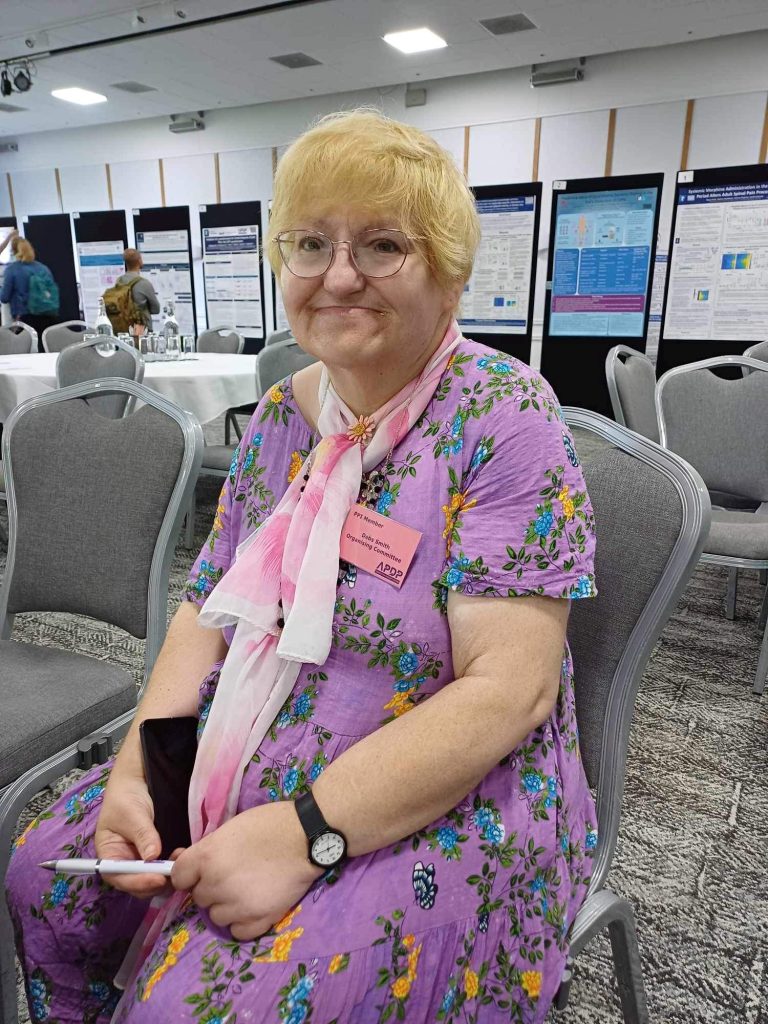
CAPE/Alleviate Conference Leads with Lived Experience Involvement
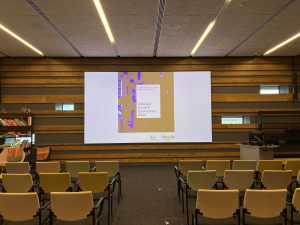
The joint CAPE/Alleviate Conference took place at the V&A in Dundee on the 23rd and 24th of May. We welcomed a wide range of speakers, including from HDRUK, Versus Arthritis and a host of academic institutions.
CAPE’s Chronic Pain Advisory Group (CPAG) members were all in attendance and led a session exploring the impact that lived experience involvement has had on CAPE’s work and looking forward to developing this further in the year ahead. This was led by Group members, Gillian Carroll and Maureen O’Reilly, who both presented to the full conference.
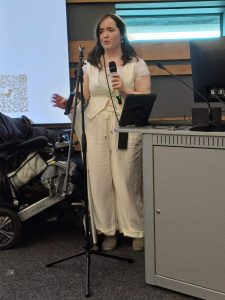
People living with pain who are involved in other research projects also attended the conference and CPAG members were able to share ideas and experiences across a range of areas.
Patient and Public Involvement and Engagement Co-ordinator, Judith Fisher, said, “Hearing directly from people with lived experience had a huge impact on the whole conference. It highlights the importance and relevance of CAPE’s work in improving the quality of life of people living with chronic pain.”

CAPE Chronic Pain Advisory Group Sharing Their Experiences of Research Involvement on a National Stage
CAPE Chronic Pain Advisory Group member, Maureen O’Reilly, recently presented at the NHS Scotland Research Conference on Patient Involvement in Research. She has written a blog about her experiences:
“Debs Smith and I were invited to speak at the NHS Scotland Research Conference on Patient Involvement in research. We were talking about our experience as members of the CAPE Chronic Pain Advisory Group.
The Conference was really interesting, highlighting the variety of projects that people with lived experience are involved in.
This was the first time in years that I’d spoken in front of such a large group of people and I felt very anxious beforehand. Talking about the impact of adverse childhood events can be really emotional. I now know that I need to take some time to myself beforehand to use calming breathing practices which helps with my anxiety.
Afterwards, participants said that they had felt inspired and privileged to hear my story.
The feedback I received has encouraged me to do more public speaking around ACEs (Adverse Childhood Events). I feel the information around the linking of ACEs and ill health really needs to be out there and spoken about more widely.
I found the whole experience really empowering. Being involved with CAPE has increased my confidence and helped me feel able to go out and communicate the work we’re involved in.”
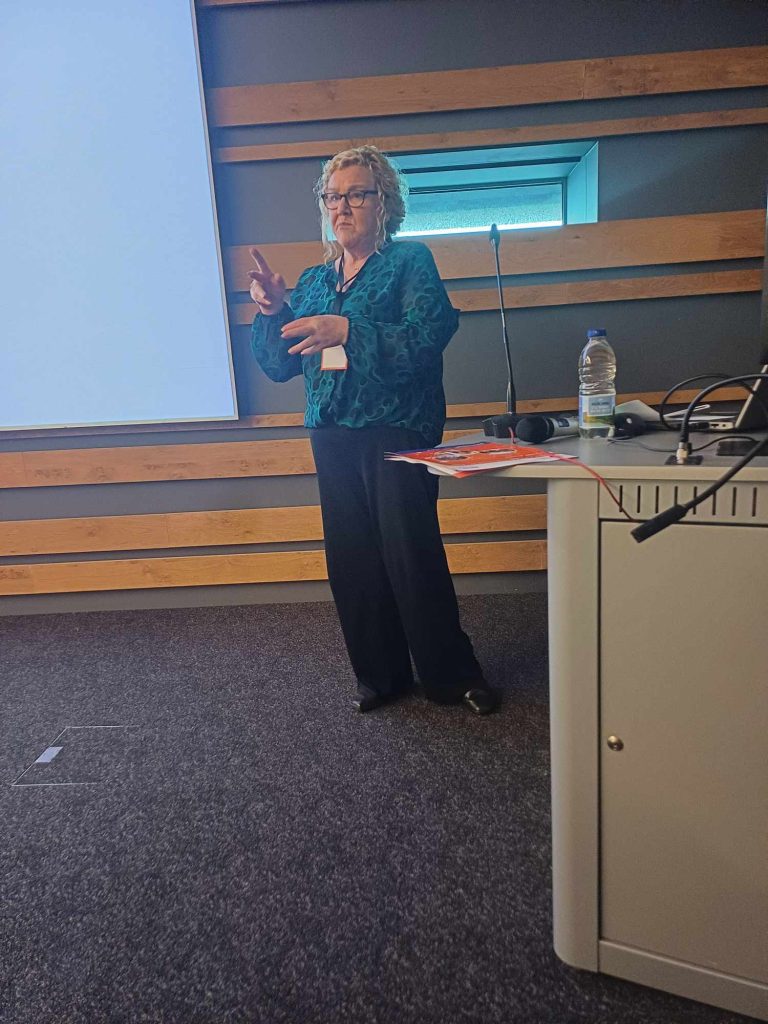
Airing Pain Podcast
Professors Tim Hales and Lesley Colvin from CAPE featured on episode 140 of the Airing Pain podcast entitled Childhood Pain – Adverse Experiences And Parental Relationships wherein they discuss how adverse childhood experiences may impact future vulnerability to chronic pain and how people respond to treatment.
The episode can be found here: https://painconcern.org.uk/airing-pain-140-childhood-experiences/
Episode Description:
(Content warning: includes abuse, neglect, and household dysfunction)
The World Health Organisation states that ‘adverse childhood experiences (ACE) can have lifelong consequences on a person’s health, and well-being, and can lead to a person developing persistent pain in later life’. A lot of this research is conducted in adults, and of course with changes in attitudes and beliefs surrounding raising children over the years, would they consider events in their childhood to be adverse?
Listen to learn more about this complex discussion. Find out how this kind of trauma in formative years impacts neurobiologically on the stress response, and causes changes on a structural and functional level in the brain that can predispose young people not only to pain but depression, cardiovascular disease, behaviours with increased health risks, and can have impact on mortality.
Contributors:
- Dr Katie Birnie, Clinical Psychologist at the University of Calgary, on the importance of validating pain in young people.
- Professor Lesley Colvin, Project Lead at Consortium Against Pain InEquality (CAPE) and Professor of Pain Medicine at the University of Dundee, and consultant in pain services.
- Jen Ford, DRAP Pain Physio & Therapy Lead at Bath Centre for Pain Services & Bristol Paediatric Pain
- Professor Lesley Colvin, Project Lead at Consortium Against Pain InEquality (CAPE)
- and Professor of Pain Medicine at the University of Dundee, and consultant in pain services.
- Professor Tim Hales, Project Lead at CAPE and a non-clinical Professor of anaethesia at the University of Dundee.
- Dr Lauren Heathcote, Senior Lecturer in health psychology at Kings College London
Timestamps
2:06 Prof Tim Hales discusses the impact on ACE on chronic pain and how people respond to treatment.
7:02 Prof Lesley Colvin Professor on how ACE causes persistent pain.
16:05 Dr Lauren Heathcote discusses the psychology of pain and symptom perception in young people.
23:26 Jen Ford on the different approach required when working with children.
26:05 Dr. Katie Bernie explore the importance of children and family partnerships.
Related links
CAPE Consortium Against Pain InEquality
Health Scotland – Adverse Childhood Experiences
TED talk: Carol Dwerk – The Power of Believing you can improve
